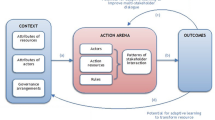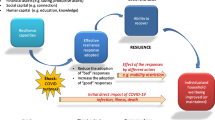Abstract
Livelihood insecurity, HIV and AIDS, and environmental change, including high climate variability, have negatively impacted the southern African region for the last decade. It is increasingly evident that there is a complex interplay of factors shaping rural livelihoods at various scales. Recognition of the varied impacts of HIV and AIDS has led to development of a conceptual framework that utilises the ‘AIDS Timeline’ or ‘Programming Matrix’, which enables differential intervention strategies to be adopted depending on the dominant impacts and trends on livelihoods. This paper presents this approach and links it to case study material from two districts in Malawi and South Africa. The evidence suggests that although there are some areas where HIV and AIDS are mainstreamed into livelihood security interventions, this is not sufficient, as holistic environmental and social approaches are not adopted. This paper reflects on the fieldwork findings to link to the AIDS Timeline in support of appropriate interventions. At the same time, we highlight the urgency in addressing the meso-scale and adopting a holistic framework that addresses livelihood security from a range of angles, including the implications for the chronically ill, interactions with environment and the capacity to implement change.
Similar content being viewed by others
Notes
Strengthening adaptive capacity of local institutions in response to the HIV/AIDS crisis in Southern Africa. Report to the FAO. 19 May 2004.
References
Aliber, M., Walker, C., Machera, M., Kamau, P., Omondi, C., & Kanyinga, K. (2004). The impact of HIV/AIDS on land rights: Case studies from Kenya. Pretoria: HSRC Publishers.
Barnett, A., & Rugalema, G. (2001). ‘HIV/AIDS’, 2020 Focus 5 (Health and nutrition emerging and re-emerging issues in developing countries), Brief 3 of 11, February.
Barnett, T., & Whiteside, A. (2006). AIDS in the 21st century: Disease and globalization. London: Palgrave Macmillan.
De Waal, A., & Whiteside, A. (2003). ‘New variant famine’: AIDS and food crisis in southern Africa. Lancet, 362, 1234–1237.
Downing, T., & Lüdeke, M. (2002). International desertification. Social geographies of vulnerability and adaptation. In Dahlem Workshop Report on Global Desertification: Do Humans Cause Deserts? ISBN 3-934504-10-8.
Drimie, S. (2003). HIV/AIDS and land: Case studies from Kenya, Lesotho, and South Africa. Development Southern Africa, 20, 647–658.
Drimie, S., & Mullins, D. (2006). Mainstreaming HIV and AIDS into livelihoods and food security programs: The experience of CARE Malawi. In S. Gillespie (Ed.), AIDS, poverty and hunger: Challenges and responses. Washington DC: International Food Policy Research Institute.
Ellis, F. (2000). Rural livelihood diversity in developing countries: Analysis, policy, methods. Oxford: Oxford University Press.
Eriksen, S. (2001). Linkages between climate change and desertification in East Africa, Part 1: Physical and social linkages, Arid Lands Newsletter, No. 49, May/June.
FAO, SOFI (2004). The state of food insecurity in the world, 2004: Factoring the resilience of food systems and communities into the response to protracted crises. FAO, Rome.
Fischer, G., Shah, M., Tubiello, N., & van Velthuizen, H. (2005). Socio-economic and climate change impacts on agriculture: An integrated assessment, 1990–2080. Philosophical Transactions of the Royal Society, 360, 2067–2083.
Gillespie, S. (2006). AIDS, poverty and hunger: Challenges and responses. Washington DC: International Food Policy Research Institute.
Gillespie, S., & Kadiyala, S. (2005). HIV/AIDS and food and nutrition security: From evidence to action. Food Policy Review 7. Washington, D.C: International Food Policy Research Institute.
Hunter, L. M., Twine, W., & Patterson, L. (2007). “Locusts are now our beef”: Adult mortality and household dietary use of local environmental resources in rural South Africa. Scandinavian Journal of Public Health, 35:3, 165–174.
IPCC (2007). Climate change 2007: The physical science basis. Summary for Policymakers. Switzerland: IPCC.
Izumi, K. (2006). Reclaiming our lives: HIV and AIDS, women’s land and property rights and livelihoods in southern and East Africa—narratives and responses. Pretoria: Human Sciences Research Council.
Leichenko, & O’Brien, K. (2002). The dynamics of rural vulnerability to global change: The case of Southern Africa. Mitigation and Adaptation Strategies for Global Change, 7(1), 1–18.
Loevinsohn, M., & Gillespie, S. (2003). HIV/AIDS, food security and rural livelihoods: Understanding and responding. Renewal Working Paper No. 2.
Mano, R., Isaacson, B., & Dardel, P. (2003). Identifying policy determinants of food security response and recovery in the SADC region: The case of the 2002 food emergency, FANRPAN Policy paper, FANRPAN, March, 2003.
Marsland, N. (2004). Development of food security and vulnerability information systems in southern Africa: the experience of Save the Children UK. Save the Children-UK, August.
Maunder, N., & Wiggins, S. (2006). ‘Food Security in Southern Africa: Changing the Trend?’ Review of lessons learnt on recent responses to chronic and transitory hunger and vulnerability, Oxfam-GB, World Vision International, CARE, RHVP and OCHA, September.
Mendelsohn, R., Morrison, M., Schlesinger, M., & Andronova, N. (2000). Country specific market impacts from climate change. Climatic Change, 45, 553–569.
Mullins, D. (2001). Land reform, poverty reduction and HIV/AIDS, paper presented at the Southern African Regional Poverty Network conference on “Land Reform and Poverty Alleviation in the Region”, Pretoria.
Nicholson, S. E. (2000). The nature of rainfall variability over Africa on time scales of decades to millennia. Global and Planetary Change, 26, 137–158.
Pingali, P., Alinovi, L., et al. (2005). Food security in complex emergencies: Enhancing food system resilience. Disasters, 29(S1), S5–S24.
Reid, P., & Vogel, C. (2006). Living and responding to multiple stressors in South Africa—Glimpses from KwaZulu-Natal. Global Environmental Change, 16(2), 195–206.
Rugalema, G., Weigang, S., & Mbwika, J. (1999). HIV/AIDS and the commercial agricultural sector of Kenya: Impact, vulnerability, susceptibility and coping strategies. Rome: FAO/UNDP.
Schulze, R., Meigh, J., & Horan, M. (2001). Present and potential future vulnerability of eastern and southern Africa’s hydrology and water resources. South African Journal of Science, 97, 150–160.
Tearfund (2006). Overcoming the barriers: Mainstreaming climate change adaptation in developing countries. Climate Change Briefing Paper 1. Middlesex: Tearfund.
United Nations High Level Committee on Programmes (2003) ‘Organizing the UN Response to the Triple Threat of Food Insecurity, Weakened Capacity for Governance and AIDS, Particularly in Southern and Eastern Africa’, Rome, 18–19 September.
Wiggins, S. (2003). Regional issues in food insecurity in southern Africa. Theme paper for the forum for food security in southern Africa. London: Overseas Development Institute.
World Bank. (1997). World Development Report 1997. World Bank, Washington, DC.
Ziervogel, G., Nyong, A., Osman, B., Conde, C., Cortés, S., & Downing, T. E. (2006). Climate variability and change: implications for household food security. AIACC Working Paper No 20.
Acknowledgements
Thomas E. Downing, Barbara Huddleston and Dan Mullins are thanked for their input into earlier conceptual work related to the paper. George Kamvazine and Vhonani Netshandama are thanked for their help in facilitating the fieldwork.
Author information
Authors and Affiliations
Corresponding author
Rights and permissions
About this article
Cite this article
Ziervogel, G., Drimie, S. The integration of support for HIV and AIDS and livelihood security: district level institutional analysis in southern Africa. Popul Environ 29, 204–218 (2008). https://doi.org/10.1007/s11111-008-0066-9
Received:
Accepted:
Published:
Issue Date:
DOI: https://doi.org/10.1007/s11111-008-0066-9




